Unit 2 Travelling Comic Strip & Welcome to the unit 课件(共26张PPT,内嵌音频)
文档属性
| 名称 | Unit 2 Travelling Comic Strip & Welcome to the unit 课件(共26张PPT,内嵌音频) | 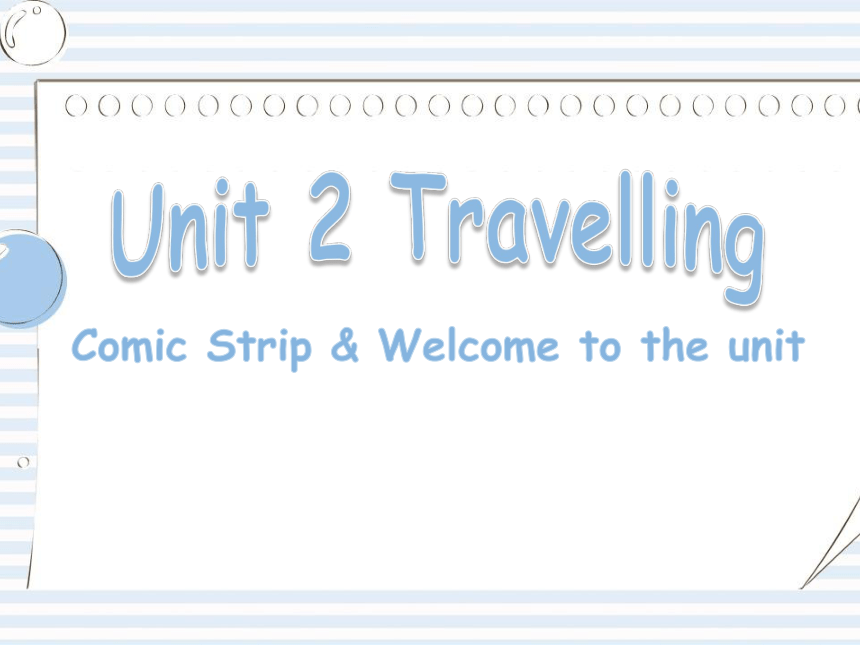 | |
| 格式 | pptx | ||
| 文件大小 | 5.2MB | ||
| 资源类型 | 教案 | ||
| 版本资源 | 牛津译林版 | ||
| 科目 | 英语 | ||
| 更新时间 | 2021-12-23 20:31:24 | ||
图片预览

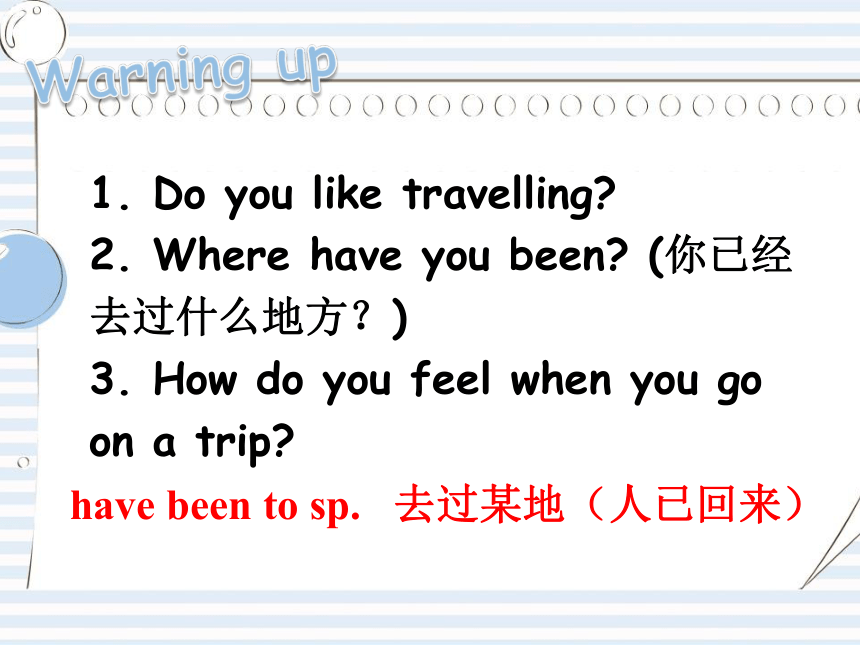
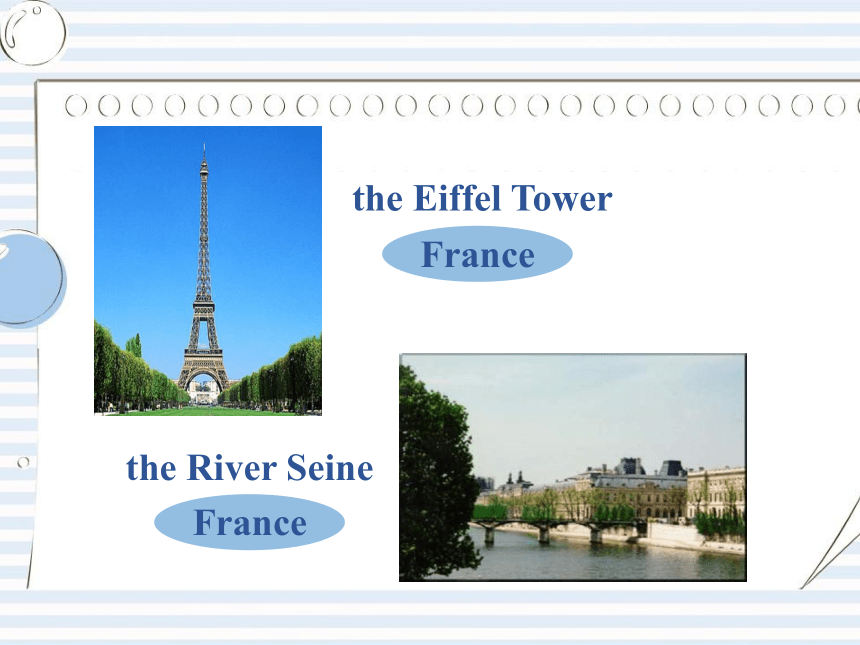
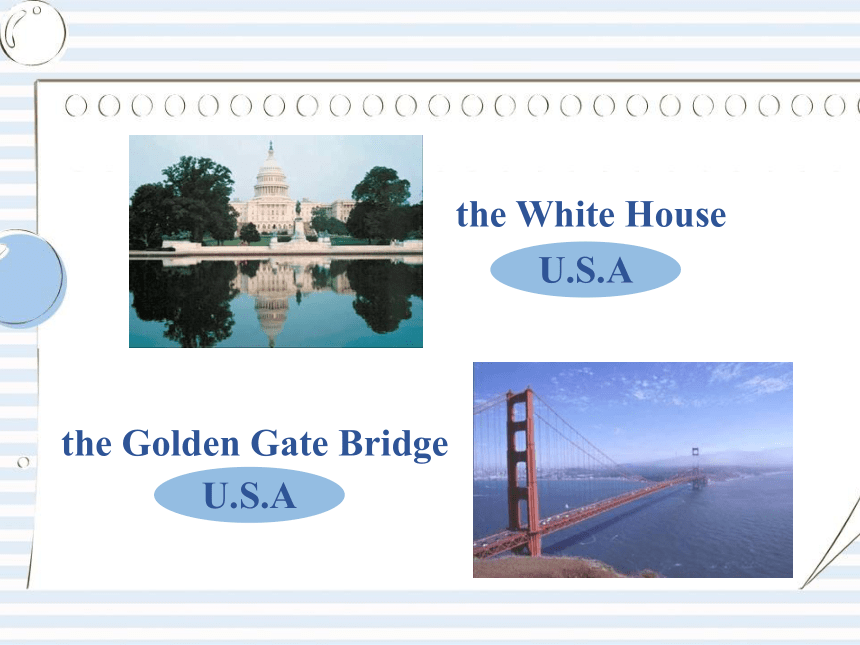
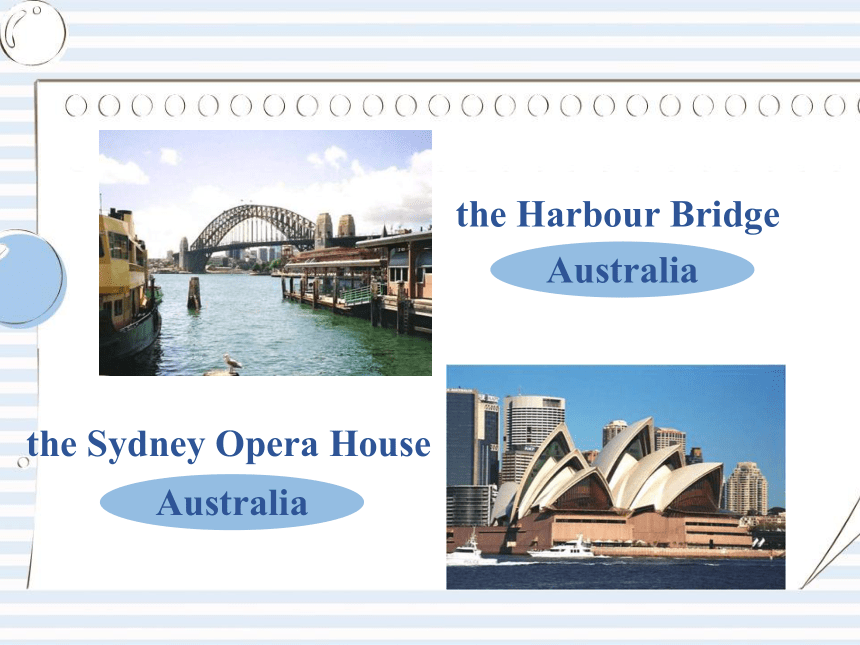
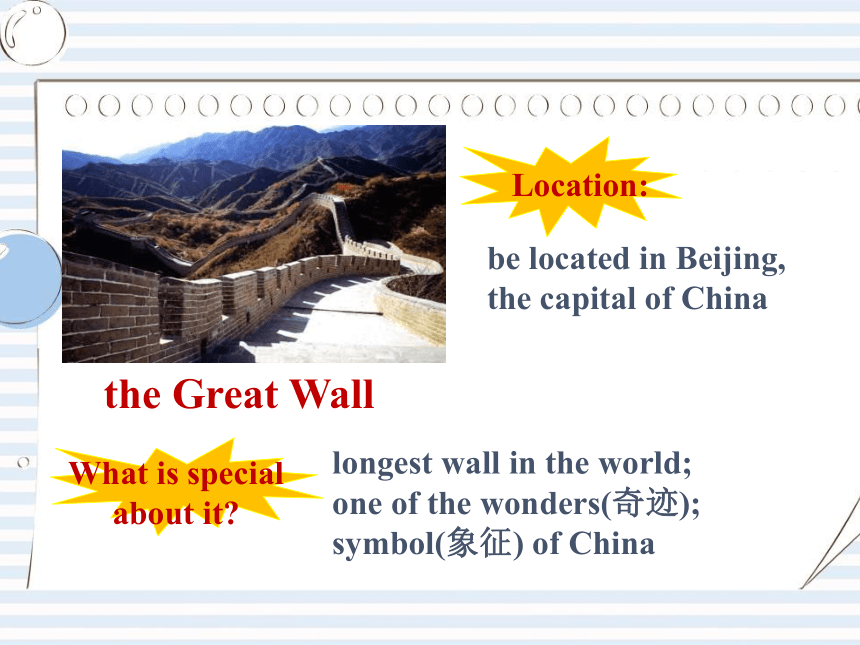
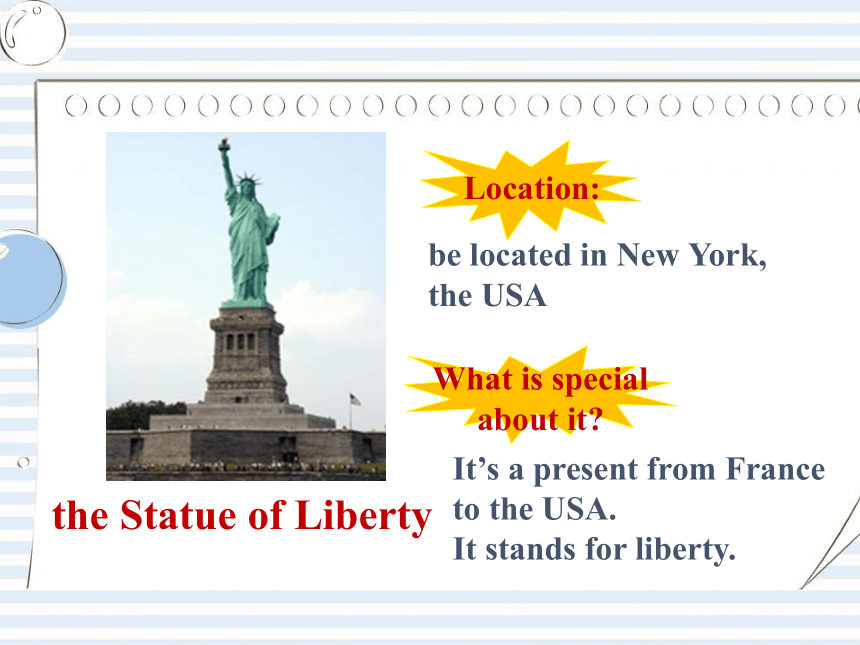
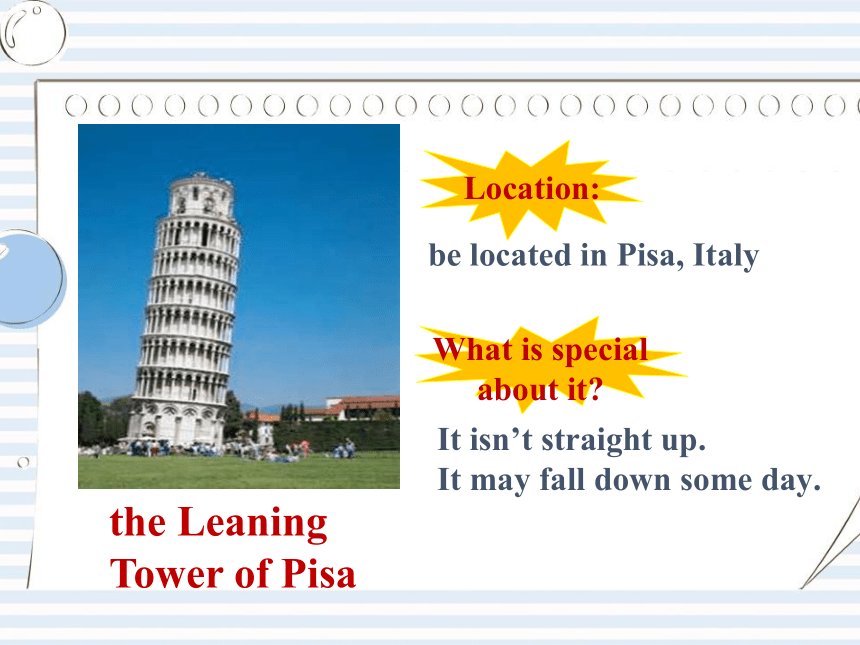
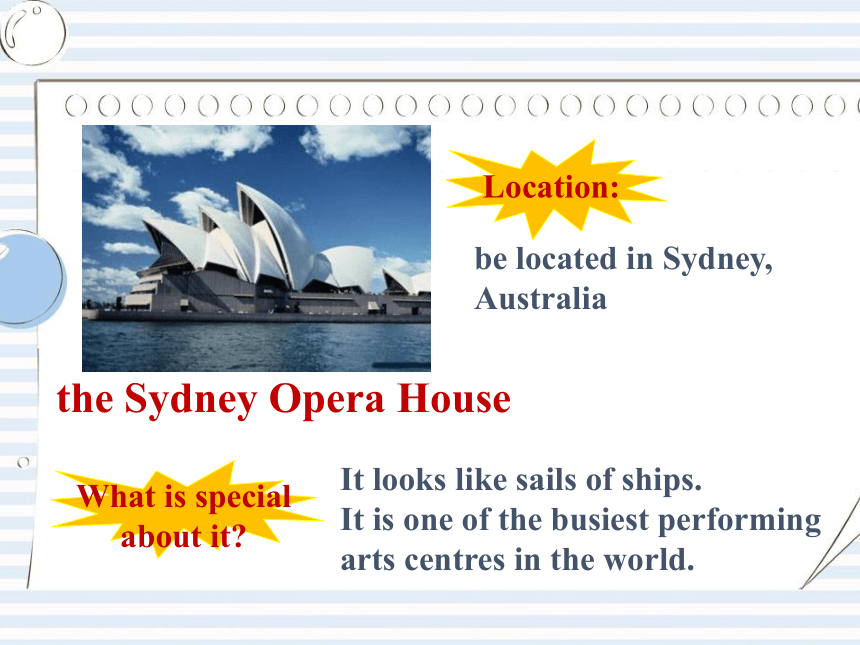
文档简介
Unit 2 Travelling Comic Strip & Welcome to the unit 课件(共26张PPT,内嵌音频)
Warning up
1. Do you like travelling
2. Where have you been (你已经去过什么地方?)
3. How do you feel when you go on a trip
have been to sp. 去过某地(人已回来)
the Eiffel Tower
France
the River Seine
France
the White House
U.S.A
the Golden Gate Bridge
U.S.A
the Harbour Bridge
Australia
the Sydney Opera House
Australia
the Great Wall
be located in Beijing, the capital of China
longest wall in the world;
one of the wonders(奇迹);
symbol(象征) of China
Location:
What is special about it
the Statue of Liberty
be located in New York, the USA
It’s a present from France to the USA.
It stands for liberty.
Location:
What is special about it
the Leaning Tower of Pisa
be located in Pisa, Italy
It isn’t straight up.
It may fall down some day.
Location:
What is special about it
the Sydney Opera House
be located in Sydney, Australia
It looks like sails of ships.
It is one of the busiest performing arts centres in the world.
Location:
What is special about it
the Tower Bridge
be located in London, Britain
It is over the River Thames in London.
It has twin towers.
Location:
What is special about it
the Little Mermaid
be located in Copenhagen, the capital of Denmark.
It comes from a story (fairy tale) by Hans Christian Andersen.
Location:
What is special about it
the Little Mermaid
the Statue of Liberty
the Leaning Tower of Pisa
the Great Wall
the Sydney Opera House
Tower Bridge
Guessing game
1. It is the longest wall in the world.
2. It is a present from French people.
It stands for Liberty.
3. It sounds like pizza. It is leaning.
It may fall down some day.
4. The girl has a fish’s tail instead of legs.
5. It is the busiest performing arts centre
in the world.
6. It is a large bridge over the River
Thames in London.
It has twin towers.
the Great Wall
the Statue of Liberty
the Leaning Tower of Pisa
the Little Mermaid
the Sydney Opera House
Tower Bridge
Daniel and Millie are talking about the places in Part A.
A: What’s this, Millie
B: It’s the Little Mermaid.
A: Where is it
B: It’s in Copenhagen, the capital of Denmark.
A: What’s special about it
B: It comes from the story by Hans Christian
Andersen.
A: Have you ever been there
B: No, I haven’t.
Pair work
Work in pairs and talk to your partner about different places. Use the conversation below as a model.
A: What’s this, Millie
B: It’s _____________________.
A: Where is it
B: It’s in _____________________.
A: What’s special about it
B: It _____________________.
A: Have you ever been there
B: No, I haven’t. / Yes, I have.
1. Where is Eddie going
He is going to South Hill for his holiday.
2. Will Hobo join Eddie
Yes, he will.
3. What is Hobo doing How does he feel
He is getting all his things. He is excited.
4. Is Eddie happy at last
No, he isn’t.
Listen to the tap and answer the following questions.
Listen and answer
Act out
Fill in the blanks
Spring is coming. Eddie is going to South Hill for his h________. Hobo says he has b_____ there before and he wants to j_____ Eddie. Eddie is h______ to hear this. He thinks, “If Hobo goes with me, he can take g______ care of me.” So he agrees and tells Hobo to get r_______. Hobo is so e________ . He p_____ all his things into a big bag. Then he tells Eddie to t______ the bag. If Eddie has to c_______ the heavy bag, will it be a holiday for him
oliday
een
oin
appy
ood
eady
xcited
uts
ake
arry
Language points
1. Can I join you
*动词join的意思是“加入;参加”,表示加入某一组织、党派、社会团体或某一人群中,成为其中一员。后接club, army, team, group或人称代词的宾格。
e.g. He is too young to join the army.
We are having dinner. Would you like to join us?
join sb in (doing) sth.表示“和某人一起做某事”,根据具体的语境,有时in (doing) sth.可以省略。
*join in多指参加小规模的活动,如“球赛,游戏”等,常用于日常用语。
e.g. Come and join in the ball game, Jack.
*take part in指参加会议或群众性活动等,着重说明主语参加活动并在活动中发挥作用。
e.g. We’ll take part in social practice during the summer holiday.
注意:如果part前有形容词修饰时,在形容词前用冠词a或an,如果没有形容词,不可用冠词。
e.g. take an active part in… 积极参加……
He takes an active part in politics.
Practice:
1. We are going on a trip to the Great Wall. Will you ________ us
A. with B. join C. join in D. take part in
2. 用take part in, join和join in的适当形式填空
1) My brother want to __________ the army.
2) I didn’t want to _____________ their argument.
3) We are playing football. Do you want to _________
4) You are welcome to _______ us.
join
take part in
join in
join
2. I don’t think it’ll be a holiday for me.
在“I /We think +宾语从句”的结构中,如果宾语从句是否定句,否定词要移到主句中,也就是“否定前移”,结构为“I/We don’t think +宾语从句”。但是否定的是从句部分的动词,其反意疑问句的主语及动词也必须与从句的主语动词保持一致。
e.g. I don’t think pigs can climb trees, can they
*使用否定前移的三个条件:
a. 主语是第一人称(I、We)
b. 主句的谓语动词是一般现在时
c. 主句的谓语动词是think, believe, support等表示心理活动的动词
Practice:
1. I don’t think she will agree with us, ____________
A. will she B. won’t she
C. do you D. don’t you
2. We believe he will come. (改为否定句)
_________________________________________
3. 我认为他不聪明,难道是吗?
_________________________________________
We don’t believe he will come.
I don’t think he is clever, is he
Useful phrases and expressions
1. go to…for a holiday 去……度假
2. join sb. 加入某人
3. get ready to do sth. 准备好做某事
4. get all my things 带上我所有的东西
5. some pictures of places of interest
一些名胜古迹的照片
6. the capital of… ……的首都
7. the story (written) by… 由……写的故事
Exercises
1. 我去过那两次。
I ________ ________ ________ twice.
2. 北京是中国的首都,他去过北京。
Beijing is ____ _________ ___ China, and he _____ _______ _______ Beijing.
3. 你愿意加入我们吗?
Would you like ____ _______ ____
4. 昨天我去南山度假了。
I ______ ___ South Hill ____ ___ ______ yesterday.
have been there
the capital of has
been to
to join us
went to for a holiday
Thank you!
Warning up
1. Do you like travelling
2. Where have you been (你已经去过什么地方?)
3. How do you feel when you go on a trip
have been to sp. 去过某地(人已回来)
the Eiffel Tower
France
the River Seine
France
the White House
U.S.A
the Golden Gate Bridge
U.S.A
the Harbour Bridge
Australia
the Sydney Opera House
Australia
the Great Wall
be located in Beijing, the capital of China
longest wall in the world;
one of the wonders(奇迹);
symbol(象征) of China
Location:
What is special about it
the Statue of Liberty
be located in New York, the USA
It’s a present from France to the USA.
It stands for liberty.
Location:
What is special about it
the Leaning Tower of Pisa
be located in Pisa, Italy
It isn’t straight up.
It may fall down some day.
Location:
What is special about it
the Sydney Opera House
be located in Sydney, Australia
It looks like sails of ships.
It is one of the busiest performing arts centres in the world.
Location:
What is special about it
the Tower Bridge
be located in London, Britain
It is over the River Thames in London.
It has twin towers.
Location:
What is special about it
the Little Mermaid
be located in Copenhagen, the capital of Denmark.
It comes from a story (fairy tale) by Hans Christian Andersen.
Location:
What is special about it
the Little Mermaid
the Statue of Liberty
the Leaning Tower of Pisa
the Great Wall
the Sydney Opera House
Tower Bridge
Guessing game
1. It is the longest wall in the world.
2. It is a present from French people.
It stands for Liberty.
3. It sounds like pizza. It is leaning.
It may fall down some day.
4. The girl has a fish’s tail instead of legs.
5. It is the busiest performing arts centre
in the world.
6. It is a large bridge over the River
Thames in London.
It has twin towers.
the Great Wall
the Statue of Liberty
the Leaning Tower of Pisa
the Little Mermaid
the Sydney Opera House
Tower Bridge
Daniel and Millie are talking about the places in Part A.
A: What’s this, Millie
B: It’s the Little Mermaid.
A: Where is it
B: It’s in Copenhagen, the capital of Denmark.
A: What’s special about it
B: It comes from the story by Hans Christian
Andersen.
A: Have you ever been there
B: No, I haven’t.
Pair work
Work in pairs and talk to your partner about different places. Use the conversation below as a model.
A: What’s this, Millie
B: It’s _____________________.
A: Where is it
B: It’s in _____________________.
A: What’s special about it
B: It _____________________.
A: Have you ever been there
B: No, I haven’t. / Yes, I have.
1. Where is Eddie going
He is going to South Hill for his holiday.
2. Will Hobo join Eddie
Yes, he will.
3. What is Hobo doing How does he feel
He is getting all his things. He is excited.
4. Is Eddie happy at last
No, he isn’t.
Listen to the tap and answer the following questions.
Listen and answer
Act out
Fill in the blanks
Spring is coming. Eddie is going to South Hill for his h________. Hobo says he has b_____ there before and he wants to j_____ Eddie. Eddie is h______ to hear this. He thinks, “If Hobo goes with me, he can take g______ care of me.” So he agrees and tells Hobo to get r_______. Hobo is so e________ . He p_____ all his things into a big bag. Then he tells Eddie to t______ the bag. If Eddie has to c_______ the heavy bag, will it be a holiday for him
oliday
een
oin
appy
ood
eady
xcited
uts
ake
arry
Language points
1. Can I join you
*动词join的意思是“加入;参加”,表示加入某一组织、党派、社会团体或某一人群中,成为其中一员。后接club, army, team, group或人称代词的宾格。
e.g. He is too young to join the army.
We are having dinner. Would you like to join us?
join sb in (doing) sth.表示“和某人一起做某事”,根据具体的语境,有时in (doing) sth.可以省略。
*join in多指参加小规模的活动,如“球赛,游戏”等,常用于日常用语。
e.g. Come and join in the ball game, Jack.
*take part in指参加会议或群众性活动等,着重说明主语参加活动并在活动中发挥作用。
e.g. We’ll take part in social practice during the summer holiday.
注意:如果part前有形容词修饰时,在形容词前用冠词a或an,如果没有形容词,不可用冠词。
e.g. take an active part in… 积极参加……
He takes an active part in politics.
Practice:
1. We are going on a trip to the Great Wall. Will you ________ us
A. with B. join C. join in D. take part in
2. 用take part in, join和join in的适当形式填空
1) My brother want to __________ the army.
2) I didn’t want to _____________ their argument.
3) We are playing football. Do you want to _________
4) You are welcome to _______ us.
join
take part in
join in
join
2. I don’t think it’ll be a holiday for me.
在“I /We think +宾语从句”的结构中,如果宾语从句是否定句,否定词要移到主句中,也就是“否定前移”,结构为“I/We don’t think +宾语从句”。但是否定的是从句部分的动词,其反意疑问句的主语及动词也必须与从句的主语动词保持一致。
e.g. I don’t think pigs can climb trees, can they
*使用否定前移的三个条件:
a. 主语是第一人称(I、We)
b. 主句的谓语动词是一般现在时
c. 主句的谓语动词是think, believe, support等表示心理活动的动词
Practice:
1. I don’t think she will agree with us, ____________
A. will she B. won’t she
C. do you D. don’t you
2. We believe he will come. (改为否定句)
_________________________________________
3. 我认为他不聪明,难道是吗?
_________________________________________
We don’t believe he will come.
I don’t think he is clever, is he
Useful phrases and expressions
1. go to…for a holiday 去……度假
2. join sb. 加入某人
3. get ready to do sth. 准备好做某事
4. get all my things 带上我所有的东西
5. some pictures of places of interest
一些名胜古迹的照片
6. the capital of… ……的首都
7. the story (written) by… 由……写的故事
Exercises
1. 我去过那两次。
I ________ ________ ________ twice.
2. 北京是中国的首都,他去过北京。
Beijing is ____ _________ ___ China, and he _____ _______ _______ Beijing.
3. 你愿意加入我们吗?
Would you like ____ _______ ____
4. 昨天我去南山度假了。
I ______ ___ South Hill ____ ___ ______ yesterday.
have been there
the capital of has
been to
to join us
went to for a holiday
Thank you!
